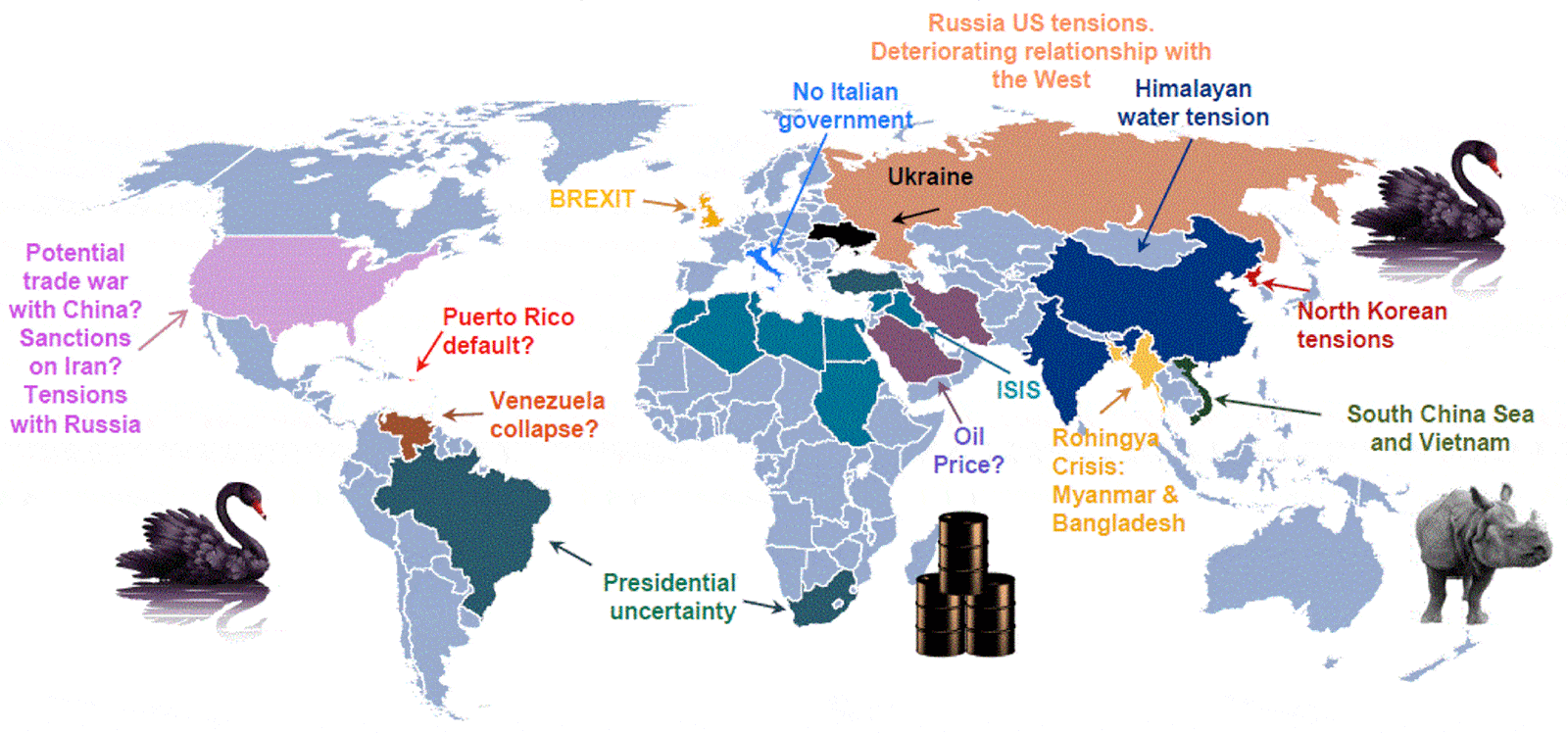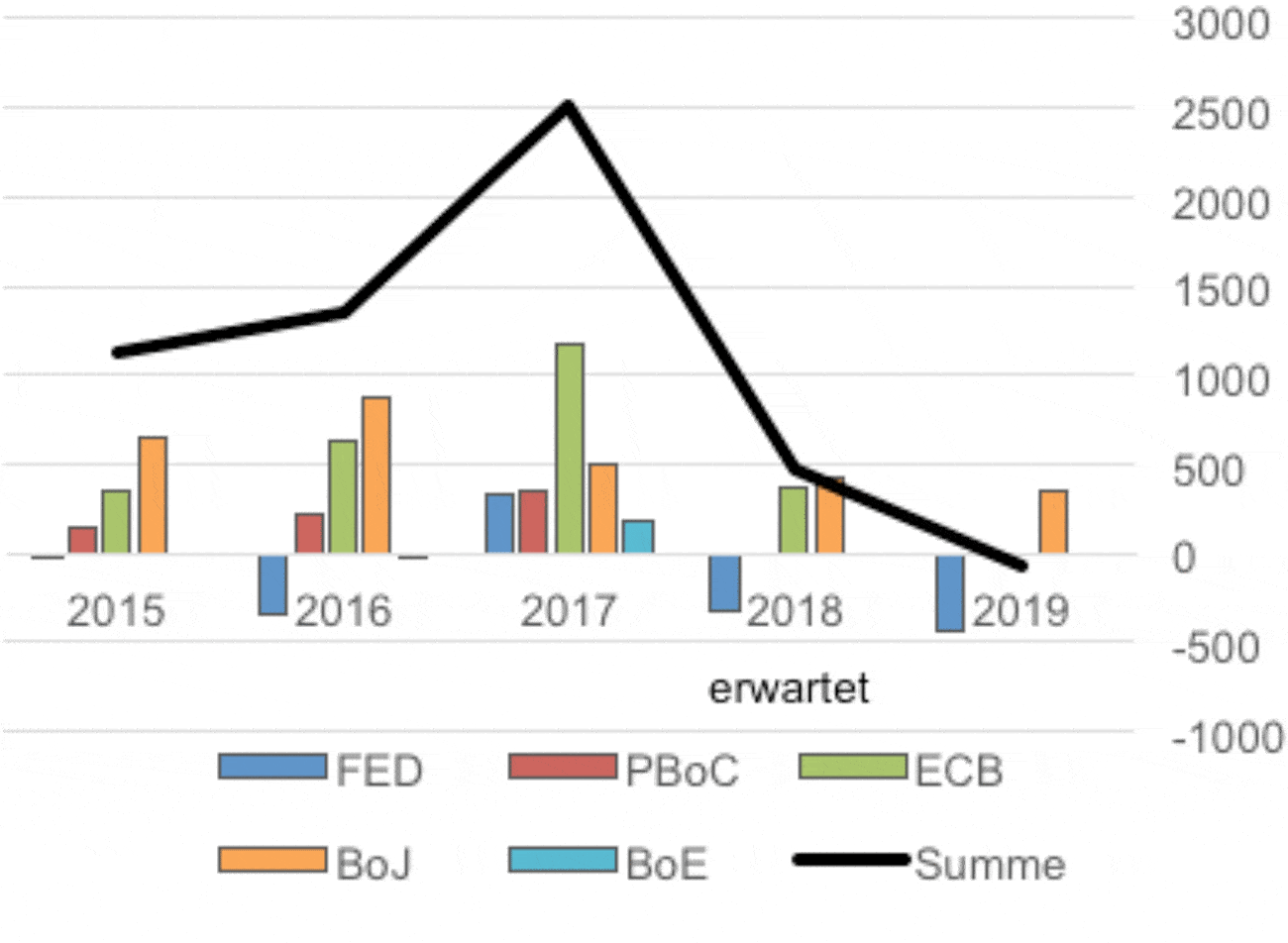Increasing trade hostilities and the net withdrawal of central bank liquidity from next year are the main threats to markets
Investors feel themselves confronted with many geopolitical risks. The most disturbing would be an escalation of trade hostilities and protectionism. We still believe a serious trade war can be avoided. 2018 is likely to go down in the history books as the “peak liquidity“ year. It’s too early to re-enter the markets.
The world economy has lost some momentum of late but we are retaining our 3.5% overall growth forecast for 2018 based on the following projections – US (2.3%), Euroland (2.0%, previously 2.1%), Switzerland (2.0%), China (6.5%) and Japan (1.2%).
Driven by sharp hikes in the cost of energy, consumer prices rose around 2% in the Eurozone in the year to June, the highest rate since December 2012. And the key price of oil has been boosted by the production cutbacks agreed in OPEC at the end of 2016 as well as the supply shortfalls out of Venezuela and Libya. But the strong global economy has also boosted the demand for oil and at the present time global demand slightly exceeds global supply. So world oil inventories have been falling. Last week OPEC reacted to pressure from the US and the oil importing countries and agreed an increase in production. Given this, the oil price should not act as an “inflation booster“ and a driver of cost pressures in coming quarters.
We are observing with increasing concern the skirmishing and provocations of the Trump Administration with respect to tariffs and trade policy. Events so far do not justify the term “trade war“ but there is the danger that hostilities will escalate in the run up to the US mid-term elections and that concern about losing face will prompt the Chinese to shift from their so-far timid defense of the present situation (which is actually unfair to the US) and move on to the attack. In the absence of clarity, investments in general are vulnerable. The current business cycle is seriously at risk if calm cannot soon be restored and corporations able once again to plan for the future with some confidence. President Trump’s crusade against free trade under the motto “America First“ could actually cause a recession.
In Germany, political chaos threatens as positions on asylum policy have become entrenched. The CSU no longer wants to support Mrs. Merkel’s policy of open borders. Indeed it cannot be associated with this policy on tactical grounds in view of the upcoming Bavarian elections on October 14. There is a real possibility of the CSU losing and a historic victory for the far right AfD.
As the graph shows, investors now find themselves confronted by a variety of significant geopolitical risks.
Graph 1: Atlas of geopolitical risks

Source: AllianzGI Capital Markets & Thematik Research, 31st March
The Fed’s inflation target has recently been achieved. But because inflation had previously been for so long below the 2% target the Fed is prepared to tolerate, and will not take measures to prevent an extended period with inflation somewhat above its target. That said, we expect two more rate hikes out of the Fed this year.
The ECB will end its monthly bond purchase program at the end of this year. But the first cyclical rise in Eurozone interest rates will not happen before the summer of next year and, indeed, may be even further out into the future.
The SNB will only be able to raise its interest rates once the ECB has taken action. Due to the politically uncertain situation in Italy, the Swiss franc appreciated again against the euro. Once again, this shows that the Swiss franc is a "bad weather currency," while the euro remains a "fair weather currency. The SNB will only raise its interest rates "in excellent weather" and only after the ECB.
The SNB has to wait for the ECB to move before it can push Swiss interest rates higher. Recent events in Italy have caused the Swiss franc to appreciate once more. Yet again the Swiss franc shows itself to be a “safe haven” in worried times, while the euro acts as a “fair weather” currency. Probably the SNB will have to wait for fabulous weather and an ECB hike rise before it can follow suit. We expect the BoE will raise UK rates again within the next three months. The UK’s growth pause in the first quarter seems to be over and the pound is among the world’s most attractively valued currencies.
“Peak Liquidity” in 2018
2019 looks like being the first year in which, on an aggregate basis, the G5 central banks withdraw liquidity from the markets. In fact, estimates suggest that the Fed will withdraw around $330bn. this year but that this will be more than offset by the liquidity injections of the ECB ($360bn.) and the BoJ ($430bn.)
Slowly, a general trend towards a normalization of monetary policy is taking shape, and this could cause financial markets to weaken. In our view, emerging markets are particularly vulnerable as are technology and highly rated growth stocks.
The Russian and Turkish central banks are currently being forced to adjust their monetary policies in order to defend their currencies. But 90% of the problems faced by these two countries are “home-made“ and do not reflect the US interest rate cycle. We view the threat of interference by President Erdogan in the policies of Turkey’s central bank as highly problematic. The additional powers that will now devolve to President Erdogan as a result of his election victory are disturbing to many international investors.
Investors should continue to be defensively positioned. Aquila is running a relatively high cash position in its portfolios at the present time. We think it is too early to recommit funds to the markets. It is probably still too early for a re-entry.
Graph 2: Liquidity flows from the G5 central banks, USD Bn.

Source: FED, PBoC, BoJ, BOE, Aquila
Contact: Thomas Härter, CIO, Investment Office
Telephone: +41 58 680 60 44
Disclaimer: Information and opinions contained in this document are gathered and derived from sources which we believe to be reliable. However, we can offer no undertaking, representation or guarantee, either expressly or implicitly, as to the reliability, completeness or correctness of these sources and the information provided. All information is provided without any guarantees and without any explicit or tacit warranties. Information and opinions contained in this document are for information purposes only and shall not be construed as an offer, recommendation or solicitation to acquire or dispose of any investment instrument or to engage in any other transaction. Interested investors are strongly advised to consult with their Investment Adviser prior to taking any investment decision on the basis of this document in order to discuss and take into account their investment goals, financial situation, individual needs and constraints, risk profile and other information. We accept no liability for the accuracy, correctness and completeness of the information and opinions provided. To the extent permitted by law, we exclude all liability for direct, indirect or consequential damages, including loss of profit, arising from the published information.
Disclaimer: Produced by Investment Center Aquila Ltd.
Information and opinions contained in this document are gathered and derived from sources which we believe to be reliable. However, we can offer no under-taking, representation or guarantee, either expressly or implicitly, as to the reliability, completeness or correctness of these sources and the information pro-vided. All information is provided without any guarantees and without any explicit or tacit warranties. Information and opinions contained in this document are for information purposes only and shall not be construed as an offer, recommendation or solicitation to acquire or dispose of any investment instrument or to engage in any other trans
action. Interested investors are strongly advised to consult with their Investment Adviser prior to taking any investment decision on the basis of this document in order to discuss and take into account their investment goals, financial situation, individual needs and constraints, risk profile and other information. We accept no liability for the accuracy, correctness and completeness of the information and opinions provided. To the extent permitted by law, we exclude all liability for direct, indirect or consequential damages, including loss of profit, arising from the published information.



